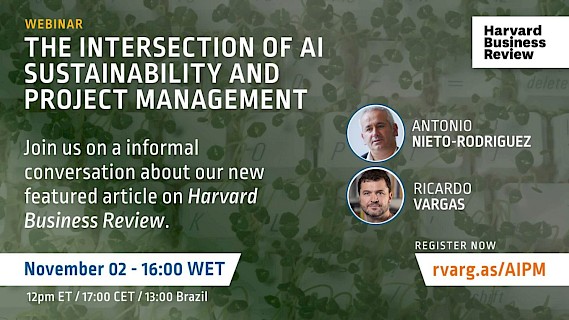Issue #8 - How AI is Disrupting Waterfall and Agile Project Management Models
This time of the year is a perfect time to think about the future, and it is impossible to think about the future without being able to measure what you want to accomplish. In this video, Ricardo explains, in the simplest possible way, the concept of OKRs, or Objectives and Key Results. OKRs are vital to understand and measure what you want to accomplish with your project, your initiatives and even in your personal life.
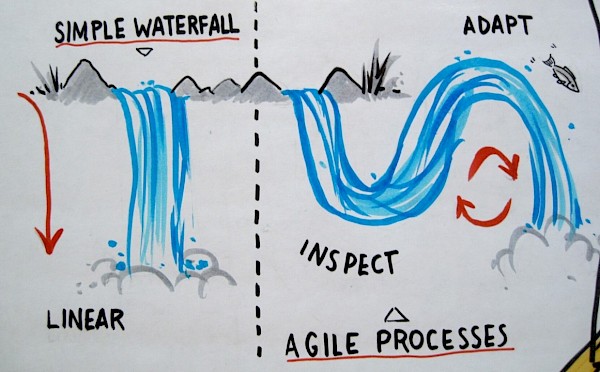
The Endless Debate Between Waterfall and Agile
Artificial intelligence (AI) is rapidly changing our world, and the field of project management is no exception. AI is being used to automate tasks, improve decision-making, and streamline processes.
Does this mean we are moving on from the old debate of waterfall or agile?
It is critical to highlight that AI significantly impacts both waterfall and agile project management models. So, the new questions to ask yourself are: "How do I apply AI to solve current challenges faster, better, and more fairly?" "Will these models still be relevant if I can use AI to help me manage the project regardless of the approach I am thinking about using?"
Waterfall project management is a linear approach to project management. It is characterized by a clear plan, with each step in the process defined and executed in sequence. This approach is often used for projects with well-defined requirements and a clear timeline, where there is no room for experimentation due to the high cost of correction.
Agile project management is a more iterative and flexible approach. Agile was conceived and formalized in 2001 when managers realized that software development projects need a more adaptive and iterative process. This was the birth of the Agile Manifesto.
Short sprints, frequent feedback, and continuous improvement characterize agile. This approach is often used for projects where the level of innovation and experimentation, combined with a changing environment, makes any prediction hard and full of mistakes.
If we compare these two definitions, we will think that waterfall models may have limited applicability to the environment we currently live in. Agile is the way we should solve complex, multi-layered problems where it is difficult to make accurate predictions about the future.
Capital projects are a clear example that you need waterfall and predictive approaches to succeed. Nobody puts a several billion US dollar project to be subjected to test and experimentation. There is too much at stake.
People think that by just saying they are using agile, some magic will happen, and their projects will become fast, nimble, and effective.
This is not true. I recorded a provocative video called Agile or Fragile, where I try to address exactly this point.
So why am I talking about AI in this context?
Product development cycles have become shorter and shorter. Technology is moving at a mind-blowing speed. With the onset of AI, newer tools are disrupting project management models in a number of ways. My dear friend Antonio Nieto-Rodriguez describes this perfectly in his recent Harvard Business Review article.
First, AI is being used to automate tasks that were previously done manually. This can, in theory, free up project managers to focus on more strategic tasks like social and team skills and responding to changes and potential crises.
Second, AI is being used to analyze and support decision-making. Recently, I delivered a talk at the PMI Symposium 2023 about disruptive uses of ChatGPT in Project Management, and the audience was shocked that it is possible to do Monte Carlo Analyses, Portfolio Management, and all sorts of data-driven decisions in a matter of seconds.
AI can analyze large amounts of data and identify patterns that would be difficult for humans to see. This can help project managers make better decisions about project scope, scheduling, and resources.
Third, AI is being used to streamline processes. AI can automate repetitive tasks, prepare reports, approve timesheets, payments, etc.
There is an endless set of possibilities, even more so in the VUCA world we are living in now.
While AI offers several benefits for project management, there are also some challenges that need to be addressed. One challenge is that AI systems can be complex and difficult to understand. This can make it difficult for project managers to trust the results of AI-powered decisions. Sometimes, it is incredibly hard for you to explain to others some of the analysis and decisions the tool provides, requiring you to have a deeper understanding of how machine learning algorithms work and produce outputs.
Another challenge is security. AI systems can be hacked. This means that project managers need to take steps to protect their data and systems from cyberattacks. Several actors in the business ecosystem want to get your data to leverage competitive advantage or even to get a ransom to decrypt your own project data.
Finally, there are biases, problems with data, legal and regulatory challenges, misinformation, scalability, and many other challenges we already discussed in previous editions.
If we want to use AI seriously, we must do it properly. The truth is that AI is disrupting both waterfall and agile project management models.
We have come a long way from the debate of which is best: Agile or Waterfall. Each approach has its own benefits and challenges, and there is no best or worst option. Each case is a different case. And on top of that, artificial intelligence can be applied in both cases and, at the same time, can completely disrupt both.
What Has Been on My Radar Recently?
Violence in the World Affects Us All
As we watch the war between Israel and Hamas unfold, I cannot help but look back at what is around us—all the uncertainty due to wars, pandemics, and the worsening of the human condition. It causes unprecedented pain and suffering for those in the region, and, in the end, it affects all of us, regardless of where we are.
I have brothers and sisters from Israel and brothers and sisters from Palestine who are suffering right now as I write this. I share my sentiments in this podcast I made while I was traveling in Brazil when the attacks against Israel happened.
Peace is absolutely the precondition for the success of any project or any progress. There cannot be genuine human progress in times of war. It is a situation that nobody wins.
We all lose.
ChatGPT Made it is Biggest Release since GPT4
This month was a remarkable innovation month for OpenAI. They just released a version that accepts all sorts of documents to be analyzed, including PDFs. It also allowed a multimode approach where you can browse, analyze data, and even generate images in the same chat.
All users of ChatGPT Plus will be able to use these features in a couple of days when OpenAI rolls out the new features.
For more information, check this Verge article.
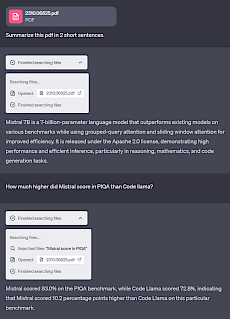
PMI Summit 2023
I just returned from Atlanta after attending and speaking at the PMI Summit 2023. It was my 26th time in a row attending the conference (I have attended since 1998 without skipping a single one, except the years of Covid-19 lockdown)!
It was a great time to connect with friends, share ideas, and see the power of the Project Management Institute community. A special highlight for me was to be able to meet some of my PMI Fellows Friends.
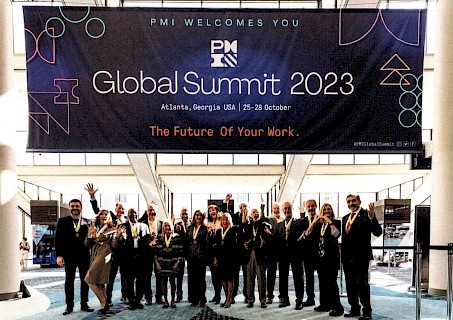
Source: PMI
I also got the first copy of the new book written by my dear friend and co-author Al Zeitoun. Program Management: Going Beyond Project Management to Enable Value-Driven Change was just published by Wiley, and it is a must-read to drive value and change in organizations.
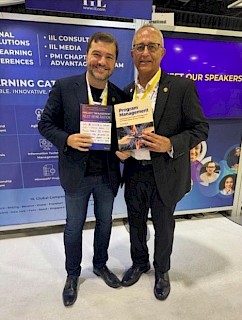
Quick Announcements
My New LinkedIn Course Reached 53,000 Students
I am truly happy to see the increasing interest in AI in Project Management. LinkedIn just informed me that my course reached more than 50k students since its release in late July.
It is hard to believe. It is about 600 people taking the course every single day. One student every 2 minutes, 24h/day
3rd Edition of the AI-Driven Project Management Revolution Masterclass Confirmed
With more than 100 participants so far, Antonio Nieto-Rodriguez and I decided to do an additional class this December 15th and 20th between 8:00 AM and 12:00 PM ET.
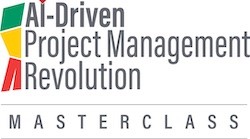
Remember that every Masterclass is different and updated with new information, releases, and trends. It is a unique opportunity for you to learn, discuss, and network with like-minded professionals and high-profile guest speakers about trends, tools, legal aspects, and all other related topics on how to bring positive change with AI in projects.
Do not miss this opportunity. Learn more about the Masterclass here.
Free Webinar About My New HBR Article on Green Algorithms
Antonio Nieto-Rodriguez and I will deliver an exclusive webinar about our new Harvard Business Review Article: The Opportunities at the Intersection of AI, Sustainability, and Project Management.
It is not enough to repeat that we face an unprecedented opportunity at the intersection of AI, project management, and sustainability. However, without proper execution, projects to implement AI come with complexities, costs, and a carbon footprint that undermine sustainability goals.
This webinar is part of our initiative to promote a better understanding of the impacts of Artificial Intelligence in projects.
The webinar is on November 2, 2023, at 12:00 PM ET, and you can register for free here.
